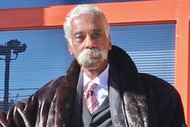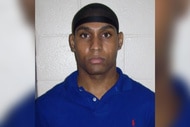Create a free profile to get unlimited access to exclusive videos, breaking news, sweepstakes, and more!
How Two Chicago Twins Became Big Players In International Drug Trade Before Helping Bring Down Kingpin El Chapo’
Peter and Jay Flores began in the Chicago drug trade before becoming key distributors for the Sinaloa Cartel, enjoying a lavish lifestyle before deciding to turn on their boss.

Chicago twins Jay and Peter Flores were once among Mexico drug kingpin Joaquin “El Chapo” Guzman’s most trusted allies, living lavish lifestyles of excess and extravagance, until they made the fateful decision to turn against the cartel boss.
The twins’ testimony was critical to putting Guzman away for life in 2019 for drug trafficking, firearms violations and conspiracy to commit murder.
Today, the Chicago-born brothers remain in hiding, fearing possible retaliation for the betrayal of their former boss, but the two men’s wives recently spoke to CNBC’s “American Greed” to reveal new details about their meteoric rise in the drug cartel and the decision to turn against one of Mexico’s most powerful men.
“Chapo was a very serious man, however, with our husbands he treated them like his sons,” Olivia Flores, the wife of Jay Flores, told “American Greed” in a new episode that premiered Monday on CNBC. “Our husbands were a huge asset to 'Chapo' Guzman.”
Olivia said that during their time trafficking, the brothers moved “100 tons of cocaine” and transformed how drugs were transported and distributed within the United States, using their business savvy and ability to seamlessly maneuver between the streets of Chicago and the mountain tops of Sinaloa, where Guzman once ran the infamous cartel.
“They were able to navigate both worlds,” Olivia said.
Michael Ferrara, former assistant U.S. Attorney, said the brothers were essentially “born into the drug trade,” after their father, a fork lift driver by day, spent his time after work operating as a narcotics trafficker.
“When the twins were little, they basically served as human cover (during) loads, where their father would bring them back and forth across the border,” Ferrara said, adding that they would often physically sit upon bales of marijuana hidden in the car during the treks.
In the mid-1990s, their father moved back to Mexico but the twins opted to stay in Chicago, where they took full advantage of their father’s cartel connections and began buying pure uncut cocaine. The twins had new ideas, however, about how to distribute the drugs.
“Before the twins, the cartels would use like the Latin Kings, and the way that they operated was territorial, you owned a territory and you guarded your territory with guns and blood but when the twins came along, they broke all the norms,” Tifani Roberts, an Emmy-award winning journalist told “American Greed.” “They tapped all the gangs. They made alliances with everybody.”
The twins soon started buying up to 10,000 kilos a month as their demand continued to increase—earning the attention of “El Chapo” in Sinaloa, Mexico.
By 2004, Guzman was a well established leader in drug trafficking, believed to have trafficked nearly $3 billion worth of narcotics across the globe, according to “American Greed.”
He often relied on innovative ways to smuggle the drugs into the United States, whether it was through man-made submarines or elaborate tunnel systems.
“He was an innovator himself and he recognized in the twins that they were smart, that they were really into expanding, just like Chapo, so they had that in common,” Roberts said.
Ferrara called the decision to bring them directly into the fold a “no brainer” for the elusive drug kingpin.
“They received the most favorable pricing structure that the cartel was willing to offer and so from that point on, they became the largest distribution points in the United States for the Sinaloa cartel,” he said.
Using Guzman’s supply and their own wholesale connections, the brothers began moving two tons, or $145 million dollars, worth of cocaine each month.
“It turned into this massive empire, so for Chapo it was a gold mine,” Roberts said.
As the country’s dependence on opioids began to grow, the twins also started selling heroin, which could be directly sourced from the poppy fields in Sinaloa and had a much higher profit margin than cocaine.
“We began seeing tremendous amounts of high-grade, cheap heroin hit the streets,” Jack Riley, a retired member of the U.S. Drug Enforcement Agency told “American Greed.”
The twins soon became an indispensable part of the operation.
“The twins were probably the largest cocaine and heroin traffickers Chicago has ever seen,” Riley said. “They became Chapo’s number one customer in the United States.”
But soon they also attracted the attention of the federal government and in 2005 a warrant was issued for their arrest on drug charges.
The twins evaded law enforcement by moving with their wives to Mexico, where they continued to play an integral part in Guzman’s operation.
While Jay worked in Mexico to negotiate different contracts with the Sinaloa cartel and the Beltrán Leyva cartel, Peter was tasked with determining the distribution routes within the United States.
Both men found themselves living a lavish lifestyle.
“We were living every drug dealer's dream,” Olivia Flores said. “Our husbands were making millions and millions of dollars, we’re talking LeBron James money. They made $10 million a month in profit.”
The “narco culture” in Mexico was a stark contrast to life in the United States and Olivia said the couples were able to “live out loud,” enjoying a warehouse full of foreign cars and their own ranch with dancing horses, monkeys and tigers.
According to Olivia, they were "making that type of money, you feel like you are invincible," but the occupation didn’t come without its risks.
“Along with that lifestyle brings a lot of heartache as well and the more money they made, the more problems they had,” Mia Flores, Peter Flores’ wife, said. “Every good moment in our family was always overshadowed by a bad moment and eventually we were all kidnapped all together.”
Both couples were kidnapped at gunpoint by corrupt law enforcement officials at a night club, but were later released after their kidnappers got a call from Guzman himself demanding their release.
But their troubles wouldn’t end there. In 2008, the Sinaloa cartel and Beltrán Leyva cartel were no longer getting along and didn’t want to share the successful brothers.
“They got themselves in a bind,” Riley said. “If they bought from Beltrán Leyva, Chapo would kill them and kill their families and everybody they know in Mexico and the opposite would be true if Beltrán Levya knew they were buying from Chapo, so really they were caught.”
The brothers soon felt their only option was to return to the United States and make a deal with the DEA and U.S. Attorney’s Office that required them to record secret conversations with Guzman.
“The thing that was most valuable to us were recordings that led directly to seizures,” Ferrara said.
The twins were able to get the elusive drug kingpin on the phone by orchestrating a ruse that one of the shipments they had received was of poor quality. Peter recorded the conversation as the two negotiated a new rate for the shipment.
“Pete was able to extract from Chapo the fact that the heroin, in fact, did come directly from him and there was a negotiated price of $55,000 per kilo,” Ferrara said. “Pete used this ruse of the quality disparity to ask Chapo for a discount of $5,000 per kilo.”
The recordings were enough to link Guzman directly to drug trafficking in the United States.
While the twins were cooperating with federal authorities, their pregnant wives remained in Mexico, interacting each day with their husbands’ unsuspecting business associates.
“You know, the Sinaloa cartel is one of the biggest, most violent organizations in the world,” Olivia said. “We didn’t think our family was going to make it out of there alive.”
The twins self-surrendered to the DEA in November of 2008, but their father remained loyal to the drug cartel and was unwilling to cooperate with U.S. authorities.
“Our father-in-law, you know, he was very upset with his sons for deciding to cooperate,” Olivia said. “The last memory they have of their father was him calling them cowards because he didn’t believe in anyone cooperating.”
Their father was kidnapped in Mexico a short time later and was presumably murdered for their betrayal.
“There was a note left on his car that in Spanish read, ‘Tell those two (expletives) to stop talking or we’ll send you his head,’” Ferrara said.
Once in federal custody, the twins broke down all the details of Guzman’s operation leading to what Roberts described as an “unprecedented judicial case for the federal government” against Guzman, who was indicted in seven different districts across the United States.
In exchange for their cooperation, the Flores twins received a 14-year sentence for their role in the drug-trafficking operation.
“When our husbands received the 14- year sentence, it was a hard pill to swallow, but I did understand that for the crimes that they committed they would have been sitting at life in prison,” Olivia said of the plea deal.
Mia said it was difficult to acclimate to life back in the United States, where both women grew up, without their wealthy husbands.
“We had to live on our own with our newborn babies and just try to figure out how to live life without our husbands,” she said.
Guzman initially managed to escape prosecution by breaking out of a Mexico prison before he was re-captured and extradited to the United States to stand trial. The brothers, along with 12 other cooperating witnesses, would testify against him in the 2019 trial that led to his conviction on multiple counts against him, including drug trafficking, a firearms charge and engaging in a continued criminal enterprise.
He was sentenced to life in prison.
While Guzman remains behind bars at the United States Penitentiary Administrative Maximum Facility in Colorado—often known as ADX or Supermax—the Flores brothers were released from prison in December 2020 after serving 12 years behind bars. They remain in hiding to this day.
Tune in to “American Greed” on CNBC Monday at 10 p.m. ET/PT.


























